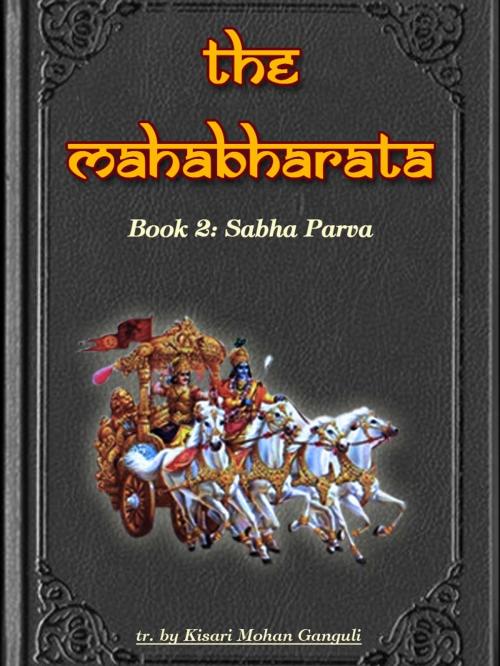The Mahabharata, Book 2: Sabha Parva
Nonfiction, Religion & Spirituality, Eastern Religions, Hinduism, Inspiration & Meditation, Spirituality, History| Author: | Kisari Mohan Ganguli | ISBN: | 1230000036090 |
| Publisher: | AppsPublisher | Publication: | December 3, 2012 |
| Imprint: | Language: | English |
| Author: | Kisari Mohan Ganguli |
| ISBN: | 1230000036090 |
| Publisher: | AppsPublisher |
| Publication: | December 3, 2012 |
| Imprint: | |
| Language: | English |
The Mahabharata, Book 2: Sabha Parva
Kisari Mohan Ganguli, tr.
Om! After having bowed down to Narayana, and Nara, the most exalted male being, and also to the goddess Saraswati, must the word Jaya be uttered.
It is of immense importance to the culture of the Indian subcontinent, and is a major text of Hinduism. Its discussion of human goals (artha or purpose, kama or pleasure, dharma or duty/harmony, and moksha or liberation) takes place in a long-standing tradition, attempting to explain the relationship of the individual to society and the world (the nature of the 'Self') and the workings of karma.
The object of a translator should ever be to hold the mirror upto his author. That being so, his chief duty is to represent so far as practicable the manner in which his author's ideas have been expressed, retaining if possible at the sacrifice of idiom and taste all the peculiarities of his author's imagery and of language as well. In regard to translations from the Sanskrit, nothing is easier than to dish up Hindu ideas, so as to make them agreeable to English taste. But the endeavour of the present translator has been to give in the following pages as literal a rendering as possible of the great work of Vyasa. To the purely English reader there is much in the following pages that will strike as ridiculous. Those unacquainted with any language but their own are generally very exclusive in matters of taste. Having no knowledge of models other than what they meet with in their own tongue, the standard they have formed of purity and taste in composition must necessarily be a narrow one. The translator, however, would ill-discharge his duty, if for the sake of avoiding ridicule, he sacrificed fidelity to the original. He must represent his author as he is, not as he should be to please the narrow taste of those entirely unacquainted with him. Mr. Pickford, in the preface to his English translation of the Mahavira Charita, ably defends a close adherence to the original even at the sacrifice of idiom and taste against the claims of what has been called 'Free Translation,' which means dressing the author in an outlandish garb to please those to whom he is introduced.
"Vaisampayana said,--"Then, in the presence of Vasudeva, Maya Danava, having worshipped Arjuna, repeatedly spoke unto him with joined hands and in amiable words,--'O son of Kunti, saved have I been by thee from this Krishna in spate and from Pavaka (fire) desirous of consuming me. Tell me what I have to do for thee.
"Arjuna said,--'O great Asura, everything hath already been done by thee (even by this offer of thine). Blest be thou. Go whithersoever thou likest. Be kind and well-disposed towards me, as we are even kind to and well-pleased with thee!'
"Maya said,--'O bull amongst men, what thou hast said is worthy of thee, O exalted one. But O Bharata, I desire to do something for thee cheerfully. I am a great artist, a Viswakarma among the Danavas. O son of Pandu, being what I am, I desire to do something for thee.'
"Arjuna said,--'O sinless one, thou regardest thyself as saved (by me) from imminent death. Even if it hath been so, I cannot make thee do anything for me. At the same time, O Danava, I do not wish to frustrate thy intentions. Do thou something for Krishna. That will be a sufficient requital for my services to thee.'
The Mahabharata, Book 2: Sabha Parva
Kisari Mohan Ganguli, tr.
Om! After having bowed down to Narayana, and Nara, the most exalted male being, and also to the goddess Saraswati, must the word Jaya be uttered.
It is of immense importance to the culture of the Indian subcontinent, and is a major text of Hinduism. Its discussion of human goals (artha or purpose, kama or pleasure, dharma or duty/harmony, and moksha or liberation) takes place in a long-standing tradition, attempting to explain the relationship of the individual to society and the world (the nature of the 'Self') and the workings of karma.
The object of a translator should ever be to hold the mirror upto his author. That being so, his chief duty is to represent so far as practicable the manner in which his author's ideas have been expressed, retaining if possible at the sacrifice of idiom and taste all the peculiarities of his author's imagery and of language as well. In regard to translations from the Sanskrit, nothing is easier than to dish up Hindu ideas, so as to make them agreeable to English taste. But the endeavour of the present translator has been to give in the following pages as literal a rendering as possible of the great work of Vyasa. To the purely English reader there is much in the following pages that will strike as ridiculous. Those unacquainted with any language but their own are generally very exclusive in matters of taste. Having no knowledge of models other than what they meet with in their own tongue, the standard they have formed of purity and taste in composition must necessarily be a narrow one. The translator, however, would ill-discharge his duty, if for the sake of avoiding ridicule, he sacrificed fidelity to the original. He must represent his author as he is, not as he should be to please the narrow taste of those entirely unacquainted with him. Mr. Pickford, in the preface to his English translation of the Mahavira Charita, ably defends a close adherence to the original even at the sacrifice of idiom and taste against the claims of what has been called 'Free Translation,' which means dressing the author in an outlandish garb to please those to whom he is introduced.
"Vaisampayana said,--"Then, in the presence of Vasudeva, Maya Danava, having worshipped Arjuna, repeatedly spoke unto him with joined hands and in amiable words,--'O son of Kunti, saved have I been by thee from this Krishna in spate and from Pavaka (fire) desirous of consuming me. Tell me what I have to do for thee.
"Arjuna said,--'O great Asura, everything hath already been done by thee (even by this offer of thine). Blest be thou. Go whithersoever thou likest. Be kind and well-disposed towards me, as we are even kind to and well-pleased with thee!'
"Maya said,--'O bull amongst men, what thou hast said is worthy of thee, O exalted one. But O Bharata, I desire to do something for thee cheerfully. I am a great artist, a Viswakarma among the Danavas. O son of Pandu, being what I am, I desire to do something for thee.'
"Arjuna said,--'O sinless one, thou regardest thyself as saved (by me) from imminent death. Even if it hath been so, I cannot make thee do anything for me. At the same time, O Danava, I do not wish to frustrate thy intentions. Do thou something for Krishna. That will be a sufficient requital for my services to thee.'















